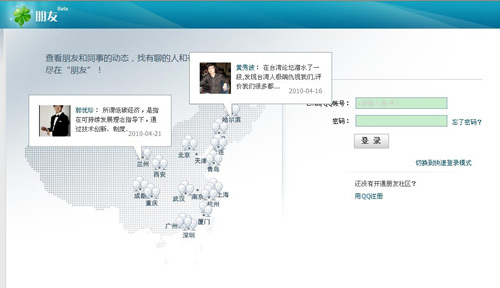腾讯再次挑战实名制社交网站:PengYou.com
PengYou.com是腾讯公司进军社交网站领域的又一次尝试。此次重新出发,PengYou.com为用户提供了一些其他腾讯服务并不具备的功能,相信PengYou.com将可以与人人网和开心网等中国社交网站一较高下。
什么是PengYou?
PengYou的中文意思是“朋友”。据游戏邦了解,很早之前腾讯公司就有意通过Qzone更新,摒弃旧版的网站设计,将Qzone打造成类似Facebook的社交网站。因此2009年初,腾讯公司继人人网之后发布了一款校园社交网站XiaoYou(校友)。然而,这款社交网站并没有引起网友的追捧,最终于2009年改版为PengYou:
2010年7月:腾讯公司将xiaoyou.qq.com导向pengyou.com,并开始对PengYou进行内测。
2010年9月:腾讯邀请中国500强公司中的2500名职员对PengYou社交网站进行首次公测。
2010年12月:社交网站PengYou对大众开放,同时腾讯公司发布了一款开放式应用程序接口——opensns.qq.com。
现在,面向办公室职员用户的社交工具office.pengyou.com仍在内测。
由邀请顶尖公司职员加盟的举动看来,社交网站PengYou.com首要面向社会精英用户,这有别于XiaoYou(校友)面向的学生大众用户。在此之前,开心网就是白领职员社交网站的一个成功先例。
PengYou的竞争优势
PengYou象征着腾讯的新一轮发展策略,腾讯致力于开发一款能与人人网,开心网和51.com相竞争的社交网站。
1,真实的个人信息
长久以来,腾讯Qzone由于实行匿名制一直被业内认为是较不成熟的社交网站,不便于广大用户建立严肃紧密的社交联系。因此,与腾讯Qzone不同,用户在申请PengYou账号是要求填写真实姓名,学历和工作背景等个人信息。
PengYou强制要求个人信息的真实性。用户如若上传不符实的照片,PengYou系统会自动删除照片并要求用户重新上传。
2,QQ连接
据游戏邦了解,中国约有6亿2000万QQ IM用户。因此,PengYou用户可以选择使用QQ账号进行登录社交网站PengYou.com。另外,PengYou用户可以自动将QQ联系人添加为“PengYou”。值得一提的是,用户在首次登录PengYou时将被要求更新真实的个人信息。
3,QQ同步
QQ同步功能用于将社交网站PengYou与腾讯其他服务同步起来。以状态更新为例,用户可以选择与Qzone,QQ IM或腾讯微博等服务同步。同时,用户可以自行选择更新的社交圈子,譬如可以选择只向公司同事显示更新等。
4,Facebook连接
当用户个人资料中出现国外大学时,PengYou.com会自动弹出Facebook登录窗口要求用户验证其Facebook账户。目前这一功能还未生效。
5,独立URL
为防止所有功能与QQ混为一谈,腾讯公司将PengYou打造成一款独立的强大服务。
6,为第三方开发者提供健康的平台环境
开发者公司板块登上PengYou.com页面,这一举动昭示着腾讯公司走向开放式的发展道路。目前尚无法确定腾讯是否可以赢得广大开发公司的信任。据游戏邦了解,人人网虽然也提供开放式应用程序接口,但由于其自身也开发游戏因此并没有为广大第三方开发公司提供良好的平台环境。
7,简洁性
最后,PengYou.com的优势在于其简洁的页面,没有嵌入过多的广告。与此相反,人人网或51.com等网站在2010年可谓是兴起一场广告大战,生生将一个个社交媒介平台塑造成了媒介渠道,往往忽略了发展的社交性。
在网站设计方面,PengYou.com给人留下了深刻印象,其定位不同于许多社交网站的广告销售路线。
即便本次的PemgYou可能并不如我预计的顺利发展,腾讯公司仍可以再接再厉。尽管前段时间与360反病毒软件的争执对腾讯公司的企业形象造成了一定的破坏,但不论如何腾讯仍然拥有着坚强的竞争实力。(本文为游戏邦/gamerboom.com编译,转载请注明来源:游戏邦)
PengYou.com is the newest entry in Tencent’s long line of SNS evolutions. Yet it has a number of qualities that are not common among Tencent’s other services and I strongly believe PengYou will be the competition for other established social networks in China (including RenRen and Kaixin001).
What is PengYou?
PengYou means friend (朋友) in Chinese. Earlier on Tencent had attempted an update of QZone, leaving the previous generation of designs behind and revamping towards the “Facebook look.” Then in early 2009 Tencent took the big step in launching XiaoYou (校友), a school based SNS site following the success of RenRen. But the site was never a hit and a year later it was scrapped and became PengYou.
* July 2010: Tencent redirected xiaoyou.qq.com to pengyou.qq.com, and begun internal beta testing of PengYou (XiaoYou ceased to exist)
* September 2010: Tencent launched the first wave of public beta testing of PengYou. 2500 employees of publicly-listed Chinese companies, including some of the Fortune 500 companies, were invited
* December 2010: PengYou open to the public and Tencent also launched its Open API: opensns.qq.com
* Currently still in internal testing is a social tool for office workers: office.pengyou.com
Tencent was intended for the elite users right from the beginning–beta invites were sent to testers from top companies. This is actually a different demographic than the students most mass-market social networks first target (including Facebook and RenRen). Kaixin001 has had some success by first targeting white-collars and employee networks.
PengYou’s Competitive Strength
PengYou is a sign of Tencent’s new development strategy, its kryptonite against competitors like RenRen, Kaixin001, and 51.com.
1) Real personal information: Tencent’s QZone was always regarded as an amateur player in SNS because of its nickname-based user profiles. It wasn’t serious enough for most users to truly build strong social networks with. With PengYou all that has changed: real name, education and work backgrounds are required when opening account.
The truthfulness is enforced, not a choice. I was surprised to see my Spiderman profile picture deleted and the site asked me to upload a real photo of me, until which my profile picture remained as a giant question mark.
2) QQ Connections: There are an estimated of over 620 million QQ IM users in China. PengYou still offers users the choice (though not a requirement) of using their QQ accounts as login (like Facebook Connect). The user can then automatically add all QQ contacts in PengYou as friends, but the catch is that the first time a user logs in, he is required to update his profile with real personal information.
3) QQ Sync: One of the most interesting functions for me is how the synchronization works between PengYou and Tencent’s other services. In the status update, users can choose to sync with QZone, QQ IM, and Tencent Microblog (t.qq.com). Statuses can share up to 200 characters and the user can also be select which social circles will receive the update. For example, a user could send an update to only others in her company (which means that it has some of the functionality of Yammer too).
4) Facebook Connection: When a user indicates a university outside of China, a Facebook login pops up and users are required to login to their Facebook account for verification. It doesn’t seem to work yet, but it’s an interesting development.
5) Independent URL: for once Tencent is not rolling everything into qq.com, which creates speculation that Tencent is serious about building up PengYou as a strong, independent service.
6) Healthy 3rd Party Ecosystem: In PengYou’s apps page, the developer’s company is also named, showing that Tencent is becoming more open-minded. It remains to been whether Tencent will be able to win the trust of developers for its Open API. RenRen, China’s current leader in real name social networks, has an open API but also develops its own apps in-house, which is disconcerting for 3rd party developers.
7) Simplicity: Personally I believe the strongest point of all is how simple PengYou is so far for its users. The site’s services can be easily accessed without seeing numerous ads.
In 2010, we saw countless ad campaigns on networks such as RenRen and 51.com. The companies behind these social networks are turning these social media platforms into MEDIA channels, often neglecting the social aspects of development.
By design, PengYou looks impressive to me. It’s developing in the right direction, especially when compared to the 2011 development strategies of other social networks, which focus mostly on selling ads.
If PengYou doesn’t play out as well as I am anticipating, then Tencent can always take another shot. The company’s image suffered during its fight with 360 anti-virus, but Tencent is still strong and determined to dominate any internet sector it enters. (Source:techrice)









































